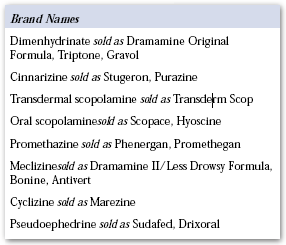Drugs Divers TakeContents of this Issue: Nekton Pilot Plays Reservation Roulette Computers That Properly Penalize Reverse Profiles When Divers Get Benched: Part III Divers, the Internet and the Industry: Part I Editorial Office: Ben Davison Publisher and Editor Undercurrent 3020 Bridgeway, Suite 102 Sausalito, CA 94965 research shows how they affect your skills from the May, 2006 issue of Undercurrent
Despite drug package warnings about drowsiness and engaging in hazardous activities, divers commonly selfmedicate for motion sickness and congestion. If you take such drugs, you may not be as sharp as you think. Several scientific studies report on how these drugs may affect you — and which are better for divers. Scop seems best: In 2001, researchers examined the performance effects of dimenhydrinate (100 mg), cinnarizine (50 mg) and transdermal scopolamine. Subjects took computerized and written performance tests, and answered questions about side effects and their feelings of well-being. Dimenhydrinate impaired decision reaction time and the ability to recall number sequences and decreased performance and feelings of well-being. Cinnarizine and transdermal scopolamine did not cause these problems.1 An earlier study also gave good marks to oral scopolamine in doses of 0.25 mg and 0.50 mg, but poor marks to promethazine (25 mg oral and 25 mg I.M.). The ability to track moving patterns across a computer screen was not significantly altered by scopolamine, but promethazine lessened subjects’ capacity by the same degree as would a shot or two of alcohol. 2 These were surface studies, but a 1988 study of transdermal scopolamine in sport divers, a placebo versus a scop patch, were compared at chamber depth equivalents of 16 and 118 fsw. All subjects had impaired manual dexterity and lower sentence comprehension at the second depth, but transdermal scopolamine didn’t independently affect performance under either condition. 3 Dramamine, Sudafed, and Others Last year researchers tested reaction time, logical reasoning, serial subtraction, multitasking and sleepiness in aircrews. They fed them promethazine (25 mg), meclizine (50 mg), dimenhydrinate (50 mg), or promethazine (25 mg) plus pseudoephedrine (60 mg). The study affirmed what most divers know — all can cause sleepiness, sometime lasting more than seven hours. Furthermore, meclizine, promethazine and promethazine plus pseudoephedrine impaired performance across all tasks, while dimenhydrinate only impaired speed in identifying a target object. 4 A 2000 study took 30 active recreational divers on a chamber ride to 66 ft, each with either a placebo, dimenhydrinate or pseudoephedrine on board. Without drugs, depth alone significantly lowered the subject’s recall for words. It also lowered mean heart rate and increased anxiety. Dimenhydrinate caused decreases in the ability to sequence numbers and letters alternately, but it didn’t significantly affect the other tests. Pseudoephedrine didn’t meaningfully affect any psychometric tests, though it did increase mean heart rate and tended to increase anxiety. The authors concluded that pseudoephedrine does not cause significant alterations in psychometric performance at 66 ft. and likely does not add significant risk to the diver. However, dimenhydrinate does adversely affect mental flexibility. Added to the effect of depth on memory, it may heighten diver risk. 5 In a study published last year, cyclizine (50 mg) and pseudoephedrine (60 mg) were evaluated during a chamber dive to 98 ft. Each of 24 subjects did six dives. Decreases in performance at depth occurred in logical reasoning and manual dexterity, no matter the drug taken. The reduction in reasoning at depth for cyclizine was greater than for pseudoephedrine or placebo, but neither drug had significant independent effects on manual dexterity.
To ingest or not to ingest? The hyperbaric medical community generally recommends that divers avoid these drugs. Keep in mind: the effects on cognitive and psychomotor behavior may increase with nitrogen narcosis as shallow as 50 feet. If you need to take motion sickness medication, scopolamine seems a better choice than dimenhydrinate. Natural remedies such as ginger may offer effective alternatives, as was discussed in a July 2005 Undercurrent piece, “Managing Mal de Mer.” Finally, give any drug an adequate topside trial to assess for adverse reactions before submerging. Take it slow until you know. And weigh all benefits against risks. – Doc Vikingo (1) J Psychopharmacol. 2001 Sep;15(3):167-72. The effects of dimenhydrinate, cinnarizine and transdermal scopolamine on performance. Gordon CR, Gonen A, Nachum Z, Doweck I, Spitzer O, Shupak A. (2) 1: Aviat Space Environ Med. 1984 Feb;55(2):113-6. Side effects of antimotion sickness drugs. Wood CD, Manno JE, Manno BR, Redetzki HM, Wood M, Vekovius WA. (3) Undersea Biomed Res. 1988 Mar;15(2):89-98. Effects of transcutaneous scopolamine and depth on diver performance. Williams TH, Wilkinson AR, Davis FM, Frampton CM. (4) Aviat Space Environ Med. 2005 Jun;76(6):560-5. Motion-sickness medications for aircrew: impact on psychomotor performance. Paul MA, MacLellan M, Gray G. (5) Pharmacotherapy 2000:20;(9):1045-1054. The psychometric and cardiac effects of pseudoephedrine and dimenhydrinate in the hyperbaric environment, Taylor et al. (6) South Pacific Underwater Medicine Society (SPUMS). 2005 Dec; 35 (4): December 2005. The effects on performance of cyclizine and pseudoephedrine during dry chamber dives breathing air to 30 metres’ depth. Graham McGeoch, F Michael Davis and Lynn Fletcher. |

I want to get all the stories! Tell me how I can become an Undercurrent Online Member and get online access to all the articles of Undercurrent as well as thousands of first hand reports on dive operations world-wide
| Home | Online Members Area | My Account |
Login
|
Join
|
| Travel Index |
Dive Resort & Liveaboard Reviews
|
Featured Reports
|
Recent
Issues
|
Back Issues
|
|
Dive Gear
Index
|
Health/Safety Index
|
Environment & Misc.
Index
|
Seasonal Planner
|
Blogs
|
Free Articles
|
Book Picks
|
News
|
|
Special Offers
|
RSS
|
FAQ
|
About Us
|
Contact Us
|
Links
|
3020 Bridgeway, Ste 102, Sausalito, Ca 94965
All rights reserved.


